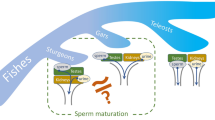Play all audios:

ABSTRACT IN some mammalian species, spermatozoa must be exposed to the female reproductive tract for some time before they acquire the ability to penetrate the egg1,2. During this time the
spermatozoa are thought to undergo an essential physiological change—capacitation3—which enables them to pass through the mass of cumulus cells surrounding the recently ovulated egg, and
then to penetrate the zona pellucida4. It is possible that capacitation is an essential prerequisite for fertilization in all mammals, but there is no direct evidence that capacitation
occurs in the human or any sub-human primate. Access through your institution Buy or subscribe This is a preview of subscription content, access via your institution ACCESS OPTIONS Access
through your institution Subscribe to this journal Receive 51 print issues and online access $199.00 per year only $3.90 per issue Learn more Buy this article * Purchase on SpringerLink *
Instant access to full article PDF Buy now Prices may be subject to local taxes which are calculated during checkout ADDITIONAL ACCESS OPTIONS: * Log in * Learn about institutional
subscriptions * Read our FAQs * Contact customer support SIMILAR CONTENT BEING VIEWED BY OTHERS POST-TESTICULAR SPERM MATURATION IN ANCIENT HOLOSTEAN SPECIES Article Open access 13 November
2023 CONTROLLED SPERMATOZOA–OOCYTE INTERACTION IMPROVES EMBRYO QUALITY IN SHEEP Article Open access 19 November 2021 A SIDE-BY-SIDE COMPARISON OF DIFFERENT CAPACITATION MEDIA IN DEVELOPING
MOUSE SPERM FERTILIZING ABILITY Article Open access 21 June 2024 REFERENCES * Austin, C. R., _Austral. J. Sci. Res._, 4, 581 (1951). CAS Google Scholar * Chang, M. C., _Nature_, 168, 697
(1951). Article ADS CAS Google Scholar * Austin, C. R., _Nature_, 170, 326 (1952). Article ADS CAS Google Scholar * Austin, C. R., _Intern. J. Fertil._, 12, 25 (1967). CAS Google
Scholar * Marston, J. H., and Chang, M. C., _J. Exp. Zool._, 155, 237 (1964). Article CAS Google Scholar Download references AUTHOR INFORMATION AUTHORS AND AFFILIATIONS * Department of
Anatomy, Medical School, University of Birmingham, J. H. MARSTON & W. A. KELLY Authors * J. H. MARSTON View author publications You can also search for this author inPubMed Google
Scholar * W. A. KELLY View author publications You can also search for this author inPubMed Google Scholar RIGHTS AND PERMISSIONS Reprints and permissions ABOUT THIS ARTICLE CITE THIS
ARTICLE MARSTON, J., KELLY, W. Time Relationships of Spermatozoon Penetration into the Egg of the Rhesus Monkey. _Nature_ 217, 1073–1074 (1968). https://doi.org/10.1038/2171073a0 Download
citation * Received: 15 January 1968 * Issue Date: 16 March 1968 * DOI: https://doi.org/10.1038/2171073a0 SHARE THIS ARTICLE Anyone you share the following link with will be able to read
this content: Get shareable link Sorry, a shareable link is not currently available for this article. Copy to clipboard Provided by the Springer Nature SharedIt content-sharing initiative
